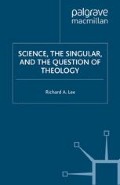Abstract
As mentioned earlier, a commission of theologians “and other wise men” drew up, at the request of the bishop of Paris, Etienne lempier, a list of propositions that could not be held or taught at Paris. Oxford soon followed in handing down similar condemnations. The condemnations focus on propositions of metaphysics, psychology, epistemology, and natural philosophy that seem to arise out of the Latin appropriation of the Islamic, and particularly Averroistic, reception of Aristotle. The condemned propositions concern everything from the agent intellect to the eternity of the world. A good number of the propositions, especially those concerning cosmology and natural philosophy, bring forth condemnation principally because of their limitations on divine power. ‘l’hère aie some such propositions that are taken from the work of Aquinas. One such proposition, which would have deep and long-lasting consequences on medieval philosophy, was “God could not make more than one world.””’’ This proposition goes to the very heart of the relation between existing singular and rational ground.”
Access this chapter
Tax calculation will be finalised at checkout
Purchases are for personal use only
Preview
Unable to display preview. Download preview PDF.
Notes
For a tracing of this shift, see Edward O’Connor, “The Scientific Character of Theology According to Scotus,” in De Docirina loannis Duns Scoti? edited by Commisio Scotistica (Rome: Commisio Scotistica. 1968). p. 9.
Joannis Duns Scotus, Opera Omnia, edited by Commissio Scotisticae, vol. i, (Vatican City: Typis Polyglottis Vaticanis, 1950), p. 100
Copyright information
© 2002 Richard A. Lee
About this chapter
Cite this chapter
Lee, R.A. (2002). Duns Scotus and Intuitive Knowledge. In: Science, the Singular, and the Question of Theology. The New Middle Ages. Palgrave Macmillan, New York. https://doi.org/10.1057/9780312299125_5
Download citation
DOI: https://doi.org/10.1057/9780312299125_5
Publisher Name: Palgrave Macmillan, New York
Print ISBN: 978-1-349-38731-1
Online ISBN: 978-0-312-29912-5
eBook Packages: Palgrave History CollectionHistory (R0)

